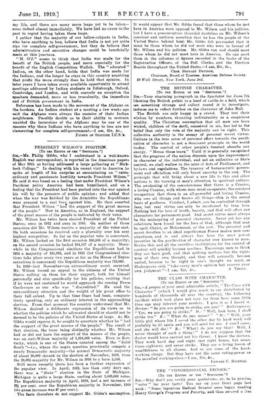THE BRITISH CHARACTER.
(To THE Boma or sea " fiviiersroa."1
Sue.,—Your charming paragraph in the Spectator for June 7th likening the British public to a herd of cattle in a field, which see something strange and collect round it to inveetigate, induces me to reflect further on the character of John Bull.
The British are only happy in a crowd. They test their wisdom by numbers, shunning individuality as a suspicious quality. The Christian assamptioa that all men are bore wicked, children of the devil, conceived in sin, has led to the belief that only the vote of the majority can be right. This collective authority is the enemy of personal secret virtue. Culture in the true sense of personal effort towards the purifi- cation of character is not a dominant principle in the world today. The control of other people's Conduct absorbs our energy. " Hence these tears." Until it is generally recognised that the progress of the nation depends upon the improvement in character of the individual, and not on collective or State Genteel, we shall wallow in the mire of Acts of Parliament, and by-laws and regulations. The tyranny of bureaucratic govern- ment and officialism will only breed anarchy in the end. The • principle that will bring about a new life to this and other nations is the turning of man's attention to spiritual culture. The awakening of the consciousness that there is a Creator, a loving Creator, with whom man must co-operate; the constant recognition that there is an all-powerful and loving Creator, who sees all things and knows all things—this is the sorest basis of goodness. Conduct, I admit, can be controlled through fear, but real virtue can only be inculcated by true lova Nothing but the love of truth, beauty, and God will affect our characters for permanent good. And secret virtue must always be the mainspring of personal character. Never yet has any ' substitute been found for the love of God, although God nosy be spelt Christ, or Mohammed, or the rest. The personal and secret devotion to an ideal superhuman Power makes men con- scientious, and is and always has been the most potent incentive to the purification of character ever known to mau. Revive this and all the countless institutions for the control of conduct will quickly become needless. Encourage men to think they are born good, and that nothing matters but the right- ness of their own thought, and they will naturally become united, because to be right in one's thought we must, as Shakespeare said, "take every man's opinion but reserve your own judgment."—I am, Sir, Sc., A THEIST.






































 Previous page
Previous page